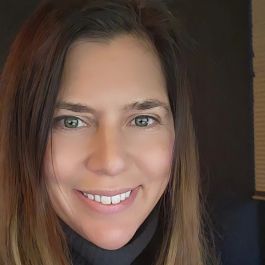“Fake it ’til you make it.”
This is the mantra of many women in tech — especially those entering the field for the first time. But it’s true for more seasoned professionals too: Even with ample experience and self-assurance, for various reasons, women in tech often grapple with imposter syndrome. So they “fake” confidence until it returns.
In a 2023 poll by the American Enterprise Institute, women of all ages were more likely than men to report experiencing imposter syndrome. Among young women, 55 percent reported encountering it, compared to 46 percent of young men. And for women in male-dominated industries like tech, the number is even higher.
Self-doubt might be a tough opponent, but there are strategies to silence the inner critic and foster instead a self belief essential for personal and professional growth. To learn strategies women in tech are using today, Built In spoke with women from Augury, Attain, Scaled Agile and more, who shared their experience with imposter syndrome and their advice for overcoming it.
5 TIPS FOR COMBATTING IMPOSTER SYNDROME
The women interviewed offered these key pieces of advice:
- Turn doubt into action to build confidence.
- Assess if your current work environment brings out your best.
- Remember past successes and positive feedback.
- Reframe your perspective when unsure.
- Find a mentor who keeps you true to yourself.
Remitly is an international payments company that leverages digital channels to send money internationally.
How have you experienced imposter syndrome in your career?
Early in my career, I was working in STEM as a junior program manager. It was my first technical role working with data scientists to research and train machine learning models. I consider my skills to be innate — I am naturally organized, I like to take the lead on things and I have an urge to keep things on track — and up until this point in my career, I had not been challenged outside of my comfort zone.
While objectively, I had achieved a lot, I was convinced that I was just lucky. I was in a new field that I knew nothing about and one of only four women on my team, and the majority of my days were spent trying to influence senior men to keep their agreed deliverables on track. I questioned my ability daily and felt out of control. I was waiting for someone to call me out and see me for the fraud I was.
How did you deal with your imposter syndrome?
Imposter syndrome was the way in which I was bullying and gaslighting myself. I wouldn’t tolerate another person treating me in that way, and it was not acceptable for me to do that to myself. Once I learned to identify the unhelpful messages and behaviors as they appeared, I used my innate program-management skills to come up with a plan. I created a playbook to help me figure out what I needed and to identify what would get me back on track, which helped me distinguish truth from fiction and helpful versus hurtful.
What advice would you give to other professional women who are dealing with imposter syndrome?
Learn the art of self-compassion. Women can be very hard on themselves, our inner critic can be cruel. I wish I had realized sooner how much inner strength and power comes from being kind to oneself and trusting oneself to fail, start again, learn and accept feedback. When I could trust myself that “good enough” was good enough, I no longer needed someone else’s voice to acknowledge my value.
When in doubt, reframe your thinking: When I reframed my experiences as belonging to my sister, whom I have deep love and endless compassion for, I challenged the inner critic and could believe the truth far easier. I began to trust that if I wouldn’t believe these messages about my sister in the same circumstances, I shouldn’t believe them about myself.
“When in doubt, reframe your thinking. If I wouldn’t believe these messages about my sister, I shouldn’t believe them about myself.”
Green Thumb Industries is a national cannabis consumer packaged goods company and retailer that promotes well-being through the power of cannabis.
How have you experienced imposter syndrome in your career?
At a previous company, I was the only woman on my team. I often felt like I had to prove myself, which only heightened my self-doubt. It’s not easy to feel comfortable and confident when you are outnumbered. There were moments when I’d receive praise for my work, but instead of feeling validated, I brushed it off as luck or attributed it to external factors. No matter how highly skilled or competent I was, it seemed like it was never enough, so I would take on more to prove myself. Eventually, I decided to seek better opportunities for my career elsewhere.
I am very fortunate to work at Green Thumb, which promotes a culture of inclusion where discussions are welcomed at all levels and employees are encouraged to pursue passion in their work.
How did you deal with your imposter syndrome?
Mentorship is a key element in promoting inclusion, especially early in a woman’s career. My mentor taught me to build my resilience by focusing on my achievements rather than potential failures, and this small change in mindset allowed me to take up more space in meetings and demonstrate confidence in speaking up, sharing my ideas and taking on larger roles. There are a lot of leadership opportunities that would benefit from greater female representation.
What advice would you give to other professional women who are dealing with imposter syndrome?
Take the time to acknowledge your accomplishments and the skills you bring to the table, and keep a record of your successes to revisit when you start to doubt yourself. When those feelings begin to creep into your headspace, remind yourself of past achievements and positive feedback.
“Remind yourself of past achievements and positive feedback.”
That said, it’s OK not to know everything. Making mistakes and facing challenges are natural parts of the learning process and do not mean that you are inadequate. The next time you are presented with new opportunities, embrace the challenge and remember that your capabilities led you to be considered for the role.
Augury provides manufacturers and other industrial sectors with insights into the health of machines, processes and operations to transform how people work.
How have you experienced imposter syndrome in your career?
My entire career has revolved around imposter syndrome.
For years, I pursued a professional playwriting career in NYC and performed around the country. Simultaneously, I needed to make ends meet. With experience as a theater producer, I took on various accounting, compliance and publicity jobs in fields like healthcare, nonprofits, fashion, politics and construction. Every time I walked through the door of a new company, I felt like an outsider.
When theater lost its appeal, I attended women-led business groups to see what creative careers might align with my interests, and that’s when I learned startups needed help with storytelling and brand voice. My specialty was building worlds and engaging audiences through words. I knew I could help, but when I landed my first client, who happened to work in tech, all my confidence evaporated. I was so self-conscious, and even though she was pleased with my work, it took a few more clients to charge what I was worth.
How did you deal with your imposter syndrome?
My mantra is “fake it ’til you make it.”
It’s what we say in theater when we get a big gig that exposes us to bigger audiences and more pressure. It’s walking into the room and owning it — even if you’re terrified — so everyone knows your work is worth their time and you’re ready for whatever larger opportunities lay ahead.
This phrase helped when I started with Augury. It was my first full-time creative job in tech, a field I didn’t know much about. It was also my first remote job. I struggled to understand the culture, and learning from senior colleagues was difficult to do remotely. Six months in, my manager left the company, my confidence was low and I was handed a huge project. The company was announcing a new acquisition and my assignments were due on a tight deadline, but my producer-playwright brain kicked in and I went for it. I collaborated with so many people and worked quickly. When everything went live, the feedback was amazing — and two months later, I was promoted.
What advice would you give to other women in tech who are dealing with imposter syndrome?
Own your worth. Everyone is their worst critic, but don’t let the thoughts get so loud. Find ways to turn your doubt into action and connect with peers to problem solve and vent.
Also, find a passion outside of work. Confidence comes from doing — fake it ’til you make it, baby.
“Find ways to turn your doubt into action. Confidence comes from doing.”
Attain’s real-time measurement and optimization solutions, coupled with high-fidelity audiences and proprietary insights, enable marketers to drive valuable outcomes like gaining new customers, retaining existing customers and increasing customer lifetime value.
How have you experienced imposter syndrome in your career?
A few years ago, before I joined Attain, I had an amazing opportunity to join a well-known startup that was on a massive growth trajectory. The company was heavily engineering focused and processes were rooted in engineering frameworks, more so than at companies I had been with earlier in my career. Despite having over 15 years of marketing experience, I often felt inadequate in my role because I lacked an engineering background — I even received feedback that I was overexplaining while presenting results from a marketing campaign.
Imposter syndrome crept in and I began to feel increasingly anxious about every task, which caused self-doubt in my ability to perform well. I worried that my work wasn’t up to par because of a perceived lack of a technical mindset, and in meetings, I found myself trying to blend in rather than speak out. During other presentations, I anxiously observed executives and reactions, fearing that I might be doing something wrong. Every meeting became a nerve-racking experience.
How did you deal with your imposter syndrome?
I was fortunate to have supportive peers I could rely on. I shared my feelings of uncertainty about my abilities and many of them reassured me that I was doing a great job, especially when it came to providing context for marketing results versus just providing hard data. This experience taught me the importance of reaching out to a support system when grappling with imposter syndrome. By connecting with peers, friends and family, I gained back confidence in my skills.
What advice would you give to other women in tech who are dealing with imposter syndrome?
It’s natural to doubt oneself — especially when faced with imposter syndrome — but it’s important to remember the journey that brought you to where you are today. Remind yourself that you were chosen for your role because you possess the right skills. Reach out to your support system, as it can be a huge help during challenging times. Also, take a moment to reflect and consider if your current work environment aligns with your values and brings out the best in you. If not, know that there are other opportunities where you will thrive.
“Reconsider if your current work environment brings out the best in you.”
I am grateful to have found myself at Attain, where I’m supported to excel in my work. Everyone feels empowered to bring their unique skills without any requirement to conform to a specific standard for success.
Bringg’s delivery management platform optimizes last-mile delivery, fulfillment and returns for retailers and carriers worldwide.
How have you experienced imposter syndrome in your career?
At one point in my career, I was the only woman leader within my region. Even though I had many years of leadership experience, I felt as though because I was new to the company, I was less than the other leaders and tenured employees — even though prior to joining the fintech space, I’d worked in finance for 11 years and could provide applicable knowledge to our customers. I was filled with a lot of doubt, and I felt as though I had to prove myself.
How did you deal with your imposter syndrome?
That same year, I made a goal to watch one Ted Talk per day. I loved Simon Sinek, Adam Grant, Amy Cuddy and Brené Brown. One of my favorite quotes of Brown’s says, “Vulnerability sounds like truth and feels like courage. Truth and courage aren’t always comfortable, but they’re never weaknesses,” and it encouraged me to share these feelings with others growing their careers, as well.
“One of my favorite quotes is from Brené Brown and says, ‘Vulnerability sounds like truth and feels like courage. Truth and courage aren’t always comfortable, but they’re never weaknesses.’”
What advice would you give to other professional women who are dealing with imposter syndrome?
My advice would be to recognize when and why these feelings kick in. I suffer from comparing myself with others, but when I do, I’m not being true to myself. Instead of comparing myself, I try to reframe it as a learning opportunity. Are there skills or behaviors they have that I can learn from? Perhaps there is an opportunity to build a mentorship relationship with someone you admire. It’s important to have someone outside of yourself to keep you honest and true to yourself.
Scaled Agile, Inc. is the provider of SAFe, the world’s most trusted system for business agility.
How have you experienced imposter syndrome in your career?
While I’ve experienced this a few times, one scenario in particular comes to mind. Ten years ago, I was in a role that was not well defined but enabled me to be part of a larger strategic decision about the focus of our company moving forward. The meeting was in a room with our founders, head of sales, head of engineering and head of product, and I thought, “Why would my opinion matter in this room full of leaders?”
How did you deal with your imposter syndrome?
My boss at the time, our head of product, sensed my hesitation and pulled me aside after the meeting. He reminded me that I had an important contribution to make and deserved to be in that room. His encouraging words and belief in me have stuck with me to this day.
What advice would you give to other women who are dealing with imposter syndrome?
You belong in that room and have much to contribute. Don’t let yourself or others make you feel or think differently. And if you see that hesitation in someone else, remind them too.
“You belong in that room. And if you see that hesitation in someone else, remind them too.”

















